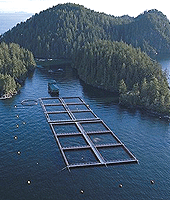Advertisement
Canadian Fish Farming
Chances are that fish on the plate in front of you came from a farm. Raised in crammed open-net farms, with untreated waste falling straight into the ocean, farmed fish higher in saturated fat and lower in omega-3 essential fatty acids than their wild counterparts are praised as the future of food. That future also … Continued
 Chances are that fish on the plate in front of you came from a farm. Raised in crammed open-net farms, with untreated waste falling straight into the ocean, farmed fish higher in saturated fat and lower in omega-3 essential fatty acids than their wild counterparts are praised as the future of food.
Chances are that fish on the plate in front of you came from a farm. Raised in crammed open-net farms, with untreated waste falling straight into the ocean, farmed fish higher in saturated fat and lower in omega-3 essential fatty acids than their wild counterparts are praised as the future of food.
That future also involves fish flesh containing antibiotics, high levels of PCBs and pesticides. There is a long list of reasons to think twice about eating farmed fish reasons we are just beginning to understand.
Fish farming, or aquaculture, has been touted as the way to meet soaring world demands for fish, while providing jobs for those left in the lurch as wild fish stocks disappear. It is currently a major growth industry, one of the most important in this country: Canadian fish farmers sold a record $691.3 million worth of product in 2000, up 11.2 per cent from 1999. Similar increases or more are expected annually.
Life on the Farm
Fish farming is exactly what it sounds like. Similar to chicken in cages on today’s commercial poultry farms, farmed fish and shellfish live in close quarters. In this case, the pens are usually set up in the ocean or freshwater bodies. In some cases, entire isolated ponds are taken over.
The industry was developed partly to meet increased world demands for fish. Given the frighteningly depleted state of many wild fish stocks, there are fears there isn’t, or soon won’t be, enough to go around.
Fish farmers exercise power over their product: the conditions are set and the fish are artificially selected for maximum growth speed.
These days, fish and other seafood products are being farmed in every Canadian province. There are farmers on the Prairies who happen to specialize in both grains and rainbow trout a scenario few would have thought likely just a decade ago.
At least 15 species are being farmed in Canada today: fin fish such as salmon, trout and halibut are popular, as are crustaceans such as mussels and oysters. Although the main export market is the United States, Canadian-farmed fish is also sold to France, Taiwan and Japan, among other countries.
Chemical Fish
One of the most vocal groups on the issue of fish farming, particularly on the West Coast, is the David Suzuki Foundation. Both Suzuki and the organization state they are not against the idea of aquaculture but the current practices used within the industry are far from what they consider ideal. Indeed, they see danger.
In February 2001, the foundation released results of a pilot project that examined toxins in farmed salmon. Researchers found levels of PCBs and dioxins 10 times higher than those in wild salmon. The reason? Farmed salmon eat mainly ground-up smaller fish farmed off the coast of South America.
“The toxins accumulate in the fat and oils,” says Lynn Hunter, fish farming specialist with the foundation. “The feed is very, very high in these toxins it’s a particular concern for nursing moms and children; these toxins can depress the immune system.”
The use of antibiotics in farmed fish has also raised red flags for many environmentalists and health advocates. As Suzuki has pointed out more than once, the European Union has banned the use of antibiotics for livestock and fish destined for human consumption. North America still allows this practice and we’re seeing the effects.
“It has been implicated in the rise of antibiotic resistance, which can make some of our most powerful drugs useless,” Suzuki says, adding he’s already seen children who cannot be effectively treated with our most-often-prescribed antibiotics.
Into Open Water
Although all fish farms must have an escape prevention and response plan, a number of fish escape from their pens every year. This number is falling–currently estimated at less than one percent but there are still fears about contaminating wild fish stocks or spreading disease.
Another major concern is the waste from the farms, which accumulates in the water directly below the pens and has been associated with the depletion of other aquatic species living near the farm.
Hunter has many examples of aquaculture gone wrong.
“Last February we received news of a major epidemic of sockeye flu. As a result, millions of fish were culled,” she remembers. “Were it not for a court injunction, those fish would have been dumped into the ocean.” As it was, they went to a landfill.
Last September, they weren’t so lucky: 900 tonnes of dead Atlantic salmon were dumped off the west coast of Vancouver Island.
“Our real concern is that governments are not looking after the public,” says Hunter. “Most people don’t realize that 87 percent of the farms are owned by five multinational companies–just one of which is based in Canada.”
“The provincial government is acting more like a public relations machine.”
Buyer Beware
Fish remains a staple protein of the Canadian diet. Hunter, and the groups she represents, suggest consumers not eat farmed fish until the industry is safe for the environment and consumers. If you’re going to eat seafood, she says, go wild.
There are no laws that say farmed fish must be labelled as such, so consumers will rarely, if ever, be able to tell how a fish was raised by what they read on the package or menu. Even “fresh fish” probably means “fresh from the farm.” It is more likely that wild fish will be labeled as such, given consumer preferences.
All consumers should question the origin of fish sold in stores and served in restaurants and give up certain species of seafood. As one example, there is no more wild Atlantic salmon: every Atlantic salmon you see in the store or restaurant has been farmed. The stocks have been depleted that much.
Although Hunter says farmed fish will generally look fattier than wild fish, it is unlikely the average consumer’s taste buds will be able to tell the difference.
For more information, visit the Coastal Alliance for Aquaculture Reform’s Web site at farmedanddangerous.org. Check out the Suzuki Foundation’s latest publications at davidsuzuki.org.
Fishy Facts
- In BC, more than 70 percent of farmed salmon are Atlantic salmon. Atlantic salmon are considered exotic (non-native or alien) species in Pacific waters since they do not naturally occur in the Pacific Ocean
- Atlantic salmon have been found in 78 BC rivers and streams, but only a small portion of our rivers have been surveyed so far meaning non-native Atlantic salmon could be inhabiting many more.
- It takes three to five kilograms of other fish, such as herring and anchovy, to make the feed necessary to produce one kilogram of farmed salmon, resulting a loss of edible animal protein worldwide.
Say No to Fish Farms
Send a letter opposing fish farming to the federal Fisheries Minister.




